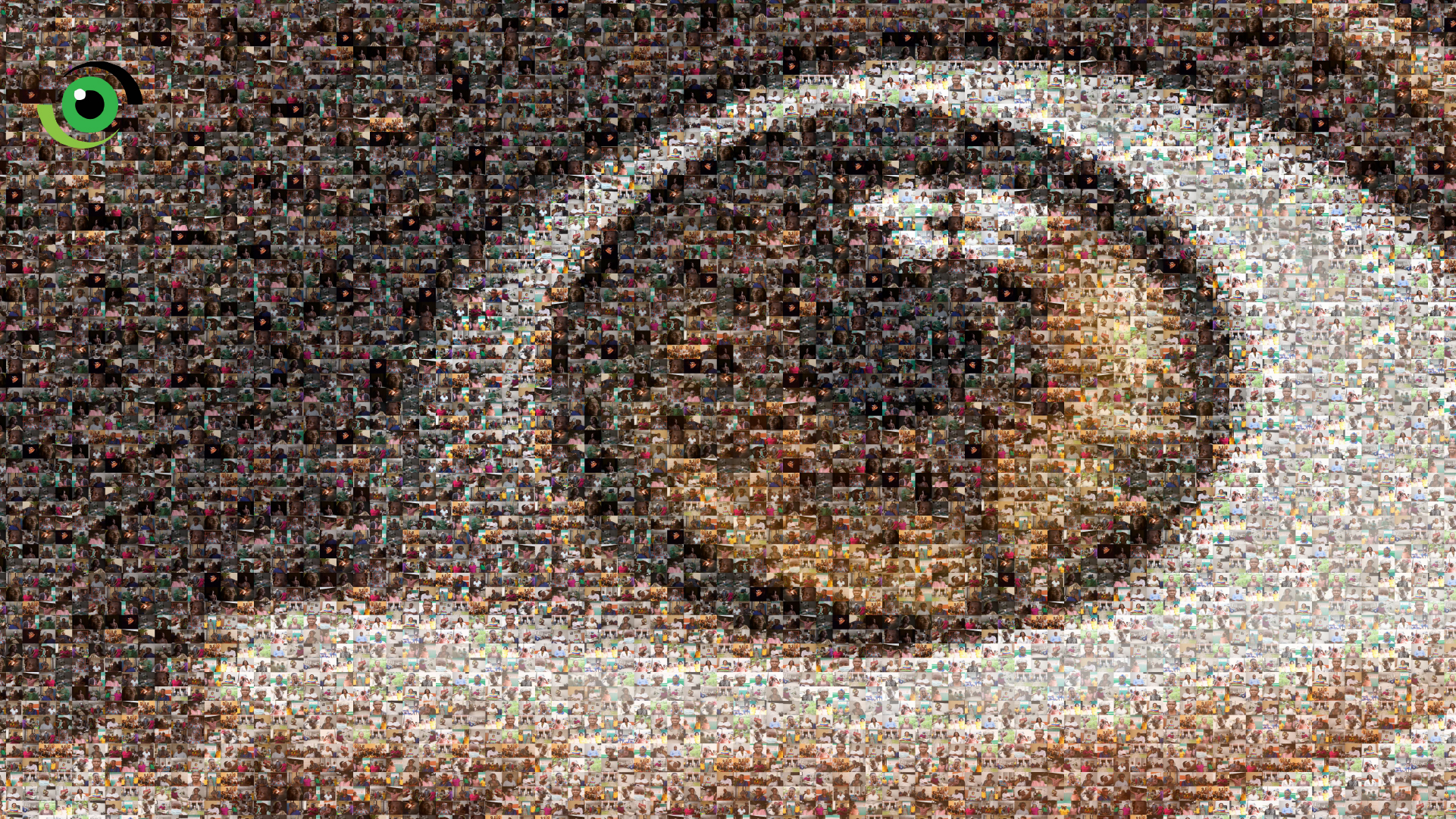By Beti Baiye and Dara Ajala-Damisa (Lead Writers)
The trip from Yenagoa was short and uneventful. We arrived the community town hall before our hosts and as they walked in, some led by friend or family members and others feeling their way along, their gait and demeanour began to tell their story long before they spoke a word.
According to this first World Report on Vision issued by the World Health Organisation (WHO) in 2019, more than 1 billion people globally are living with vision impairment because they do not get the care they need for conditions like short and far sightedness, glaucoma and cataract.
Statistics represent people. As we listened to the people of Gbarantoru of Bayelsa State, Edagberi Betterland and Umuebule communities of Rivers States tell their stories, we knew they were part of the 1 billion people quoted in the WHO report. They narrated their experiences with eye disorders and how that affected their lives:
“I never expected that I will experience this in my life. When it started, every day I would look out and not see the sun clearly. Things started to turn dark and I began to ask myself how I was going to be able to survive in the world without my eyesight.” Evelyn A.
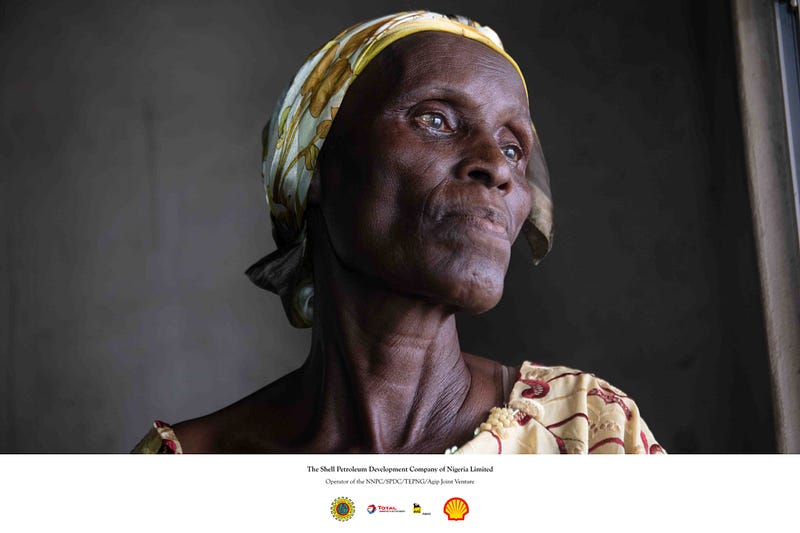
“Since this eye problem started and I stopped seeing well, it has been a big concern to me. Life has really been difficult especially in moving around and doing things I should do and there is no one around to help me.” Apple I.
“The condition started with a headache. I went home to take drugs but there were no drugs and my parents were also not at home, so I slept off. When I woke up the next morning everywhere was white just like during the harmattan, then I started seeing red, and then it changed to brown and then turned to white again”. Faith A.
The 2005–2007 Nigeria National Blindness and Visual Impairment Survey show that an estimated 1.13 million individuals aged 40 years and above are currently blind, 2.7 million adults aged 40 years are estimated to have moderate visual impairment, an additional 400,000 adults are severely visually impaired and 4.25 million adults aged 40 years in Nigeria are visually impaired or blind.
As part of the social investment initiatives, Shell Petroleum Development Company of Nigeria Limited (SPDC) with its Joint Venture partners, are supporting health programs and initiatives in host communities to bridge the gaps in the health sector. Through its flagship Health-in-Motion program and other health initiatives, eye care and vision health have been included in the bouquet of services delivered to the communities.
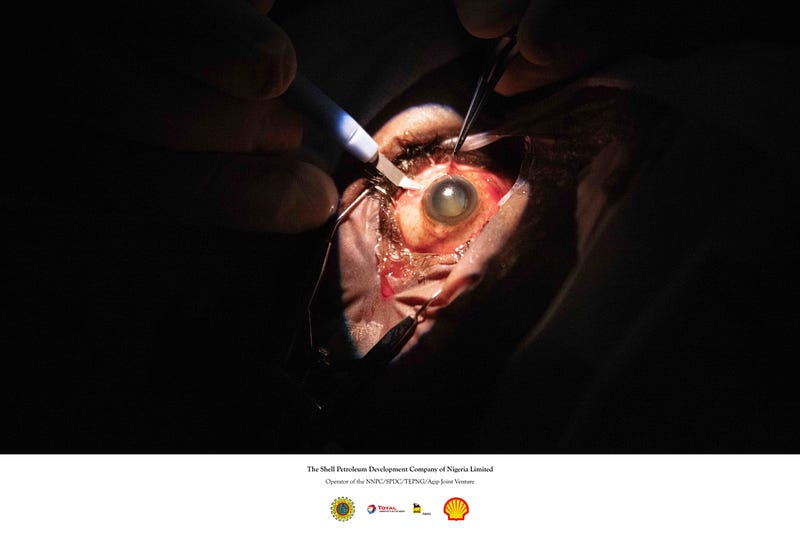
Backed by this evidence and SDG 3 — the Global goal on health, which embeds equitable eye care for all, a decision was made to strengthen support for eye health and improve access to qualitative eye care services. The SPDC JV — ‘Vision First Initiative’ was then birthed. According to Dr Akinwumi Fajola, Regional Community Health Manager, Shell, Sub-Saharan Africa, “We see quite a number of preventable and treatable visual impairments which people have been living with during our Health-In-Motion outreach activities. Using the partnership approach, we then catalyzed this initiative, focusing on early detection of visual impairments and supporting selected cases that need treatment including surgeries in pilot communities”.
This initiative began in 2019 and is being implemented in partnership with Governments of Bayelsa and Rivers States, host communities and Pro-Sight International Eye Foundation as a public-private-people-partnership. It is designed to support efforts to improve quality eye health and eliminate preventable and treatable blindness. It is being piloted in 3 communities: Gbarantoru in Bayelsa State, Edagberi Betterland and Umuebule communities in Rivers State. The strategy is simply to make eye care people-centered and provide sustainable solutions by integrating eye care in primary health care to address visual disability.
According to Rebecca Ogbimi, Shell Vision First Program Lead, 911 persons with mild to complex visual conditions were screened in communities. Many received medications and others with refractive errors and Presbyopia (inability of the eye to focus sharply on nearby objects) had corrective lens (eyeglasses). For others, despite the challenges brought about by the COVID-19 pandemic, the team has conducted over 52 ophthalmic laser surgeries on community members. The surgeries lasted an average of 25 -30 minutes each but changed the lives of the beneficiaries for good.
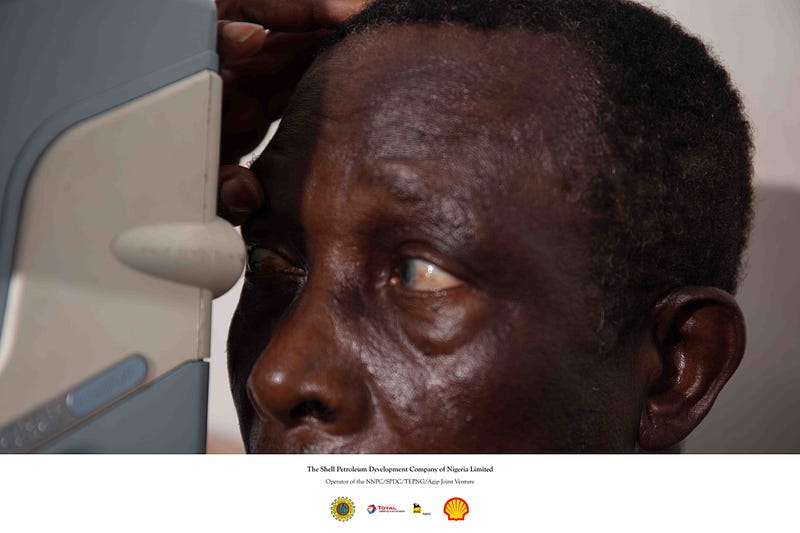
Dr. Ndidi Utchay, Permanent Secretary Rivers State Ministry of Health said, “We want to thank our partners for this important work restoring sight to community people. The government cannot do it all, that’s why we need partners like Shell, ProSight and others.”
Commenting on the initiative, Dr Inodu Nathaniel Apoku, Permanent Secretary, Bayelsa State Ministry of Health said, “When I got to know that Shell was into this sort of intervention, I was happy because sometimes, our people are not aware of the factors that cause loss of vision.”
For Rebecca, this is more than just a project. It is a personal commitment to ensure that no one goes blind from preventable causes. It is driven by the memory of her father who lost his sight to Glaucoma due to lack of awareness, poor diagnoses and traditional practices, she said.
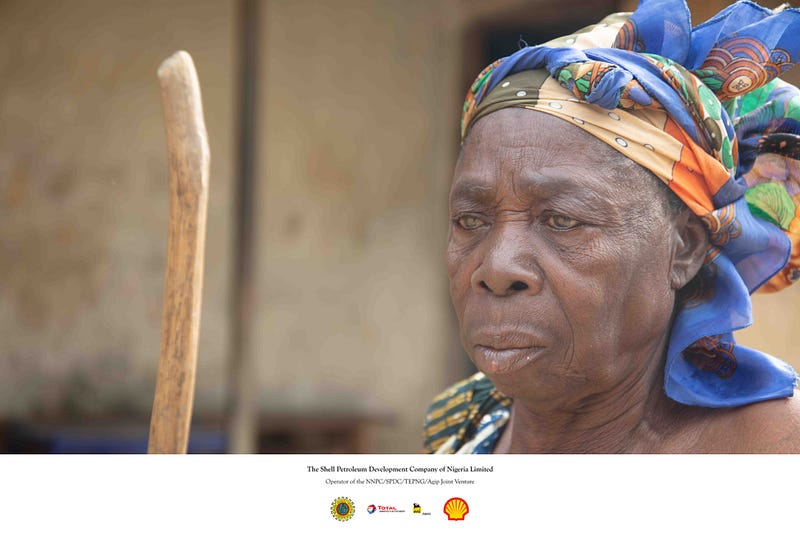
Thursday, October 8, 2020, is World Sight Day. It is a day that is increasingly becoming one of the most important communication and advocacy events on the eye health calendar. Vision is an aspect of physical health which is largely neglected. This year’s theme is ‘Hope in Sight’ and the aim this year is to draw attention to a range of issues surrounding blindness and visual impairment.
One thing that became apparent from our conversations with beneficiaries of the Vision First project was the strong link between deteriorating vision and an individual’s mental well-being. It’s easy for those with poor vision to begin to feel isolated as their daily interactions with other people decrease. This, and an increasing dependency on people around them, can contribute to depression, anxiety and an overall decline in mental health. Psychological distress and heightened anxiety has been found to be one of the most common reactions to vision loss. Reflecting on the painful experience of her father’s loss of vision, Rebecca said she believes that visual impairment and blindness is one of the most distressing and incapacitating disabilities known to man.
We and our colleagues from EpiAFRIC, who had spent almost two weeks listening to stories of community members in order to fully understand and document the Vision First Initiative story, found ourselves at the end of each day reflecting on just how difficult loss of sight must be, and grateful for the opportunity to tell these incredible stories of hope.
When poor vision starts earlier in a person’s life, the feeling of helplessness can set in early. For 68-year old Rachel John, her vision problems started when she was just 40 years old. “It became worse 2–3 years ago. I could not go far; I was ashamed because it was difficult for me to recognize people I know. I had to pretend like I didn’t know them or blame it on old age because I couldn’t see them. It was shameful for me,” she said.
Because poor eyesight is often a chronic problem that starts slowly, the tendency is to ignore the symptoms and not seek care early, or worse, seek care from the wrong sources. This was the case for Ebrakumo Festus, who asked that we do not use her real name. She spent more seeking care for her dwindling eyesight from ‘spiritual houses’ than she would have, had she gone straight to the hospital. As her eyesight began to worsen, she put off going to the hospital because once she heard that she would need an ‘operation’, she imagined that she could not afford it, she said. Her children managed to scrape up a total of about N150,000, paid in installments, which was paid to a ‘pastor’ who promised to fix her eyesight. Unfortunately, all she got were few bottles of syrup, oils and irreparable eye damage. The doctors at Pro-Sight were somber as they disclosed that due to the time elapsed and the harmful procedures, Ebrakumo vision impairment had become permanent.
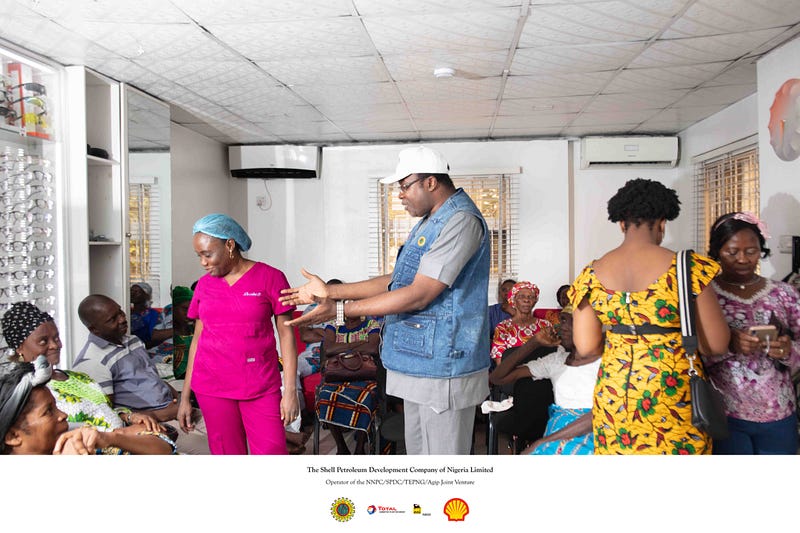
Part of the work that the Vision First Team does is community education drives, to improve eye care literacy. The goal is to make sure that curable cases of vision impairment do not become irreversible. Dr Bassey Fiebi, Ophthalmologist, Ophthalmic Specialist Hospital said, “What we like to say to them is, spread the word. Let people know that you don’t need to live blind needlessly. A lot of the conditions can be treated and can be cured. Tell your neighbour to tell your neighbour”.
To Rebecca, Hope in Sight means everything, because “when there is no hope there is no future. At Shell Companies in Nigeria, we want to give hope to the people. The stories here are all examples of hope to individuals, families and communities. As we commemorate World Vision Day, it is our dream that no visually impaired person is left without care.”
Sustaining the momentum for better eye care in the Niger Delta
Dr Umaka Oko, Consultant Ophthalmologist and part of the Pro-Sight team believes that this program cannot be a one-time intervention, because “As you are tackling one phase, new ones are coming up to add to the burden. The process should continue, and at the end of the day, we can have a community where people are not blind from preventable causes. That is actually our goal here. There are other causes of blindness that have hereditary causes, which you can’t help. But our goal is preventing blindness from causes that are preventable and the community will be better off for that.’
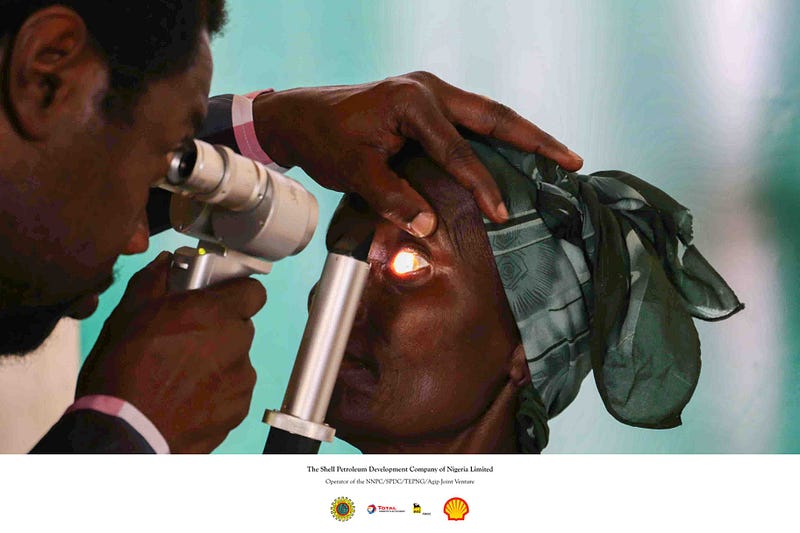
For sustainability, the Vision First partnership of SPDC JV, Pro-Sight, the communities and the states Government believe others will get involved to improve eye care especially in remote rural communities. Given the unique ecological peculiarities of the Niger Delta, it is important to scale-up eye health awareness in communities. Partnership with states is important to strengthen skills of the primary health centres who are strategically positioned to provide basic screening, thus preventing more heartbreaking cases like that of Ebrakumo.
Dr Fajola pointed out that, “The opportunity of this pilot will help build the capacity of community health care workers in case detection of visual impairment in our primary health care system. Sustainable partnerships with stakeholders and specialized health NGOs like Pro-Sight international Foundation will also be important as we build an ‘army’ of people and human resources for health, who are able to detect simple early onset eye impairments, in order to reduce the risk of visual loss. From Shell and our JV partners led by NNPC, we hope these few seeds sown, will germinate and aid our budding equitable eye care services for all in our nation”.
What Hope in Sight Means to Us
The Amadis (Dara Ajala-Damisa)
As we speak with beneficiaries of the Vision First intervention, I am struck by an energetic couple, walking arm in arm. What catches my attention is not just that they both look like they have just had eye surgeries, it is the spring to their step and the obvious dependence on each other.
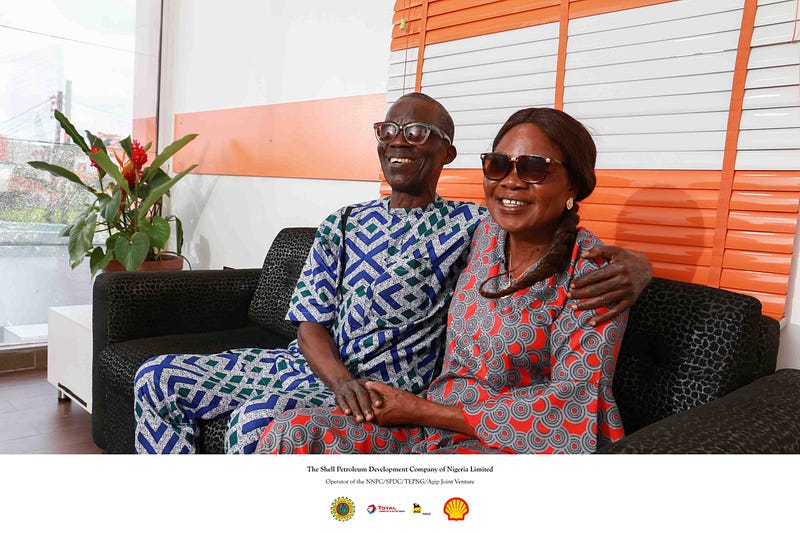
As a true graphic designer, husband Stephen Amadi shares his joy in a lot of colour;
‘Before the first operation, I couldn’t even see your face as you sit there. I couldn’t see far, but after the first operation, I was glad I was seeing digital colors that I had not seen since the eye problem started. For example, my slippers, I used to think it was dark red or brown and I found out that after the surgical operation that it was pink. Everywhere was very neat and clean to me unlike before when it was very dark and dirty. I am so glad.’
Celina’s vision challenges began in the 1990s. As it worsened, she could not go outdoors after dusk. She shared how her worsening eyesight forced her to stop reading since any attempt to do so usually resulted in severe headaches. Her biggest joy after the surgery is being able to see her husband clearly for the first time since the 1990s.
This for me is what Hope in Sight means.
Apple Iselemelagha (Beti Baiye)
The first time I met Apple, she looked so pitiful, it wrenched my heart. She lived alone, didn’t have anyone to take care of her and had to do everything on her own. “Since this eye problem started and I stopped seeing well, it has been a big concern to me…It really troubled me because I was getting blind and I could hardly see, especially as there was no money to take me anywhere for medical attention,” she said.
I left Bayelsa state wishing that I could take her with me and make sure that she received proper care. I was happy that she was finally getting her surgery and I kept praying that everything would go well. This was in February 2020.
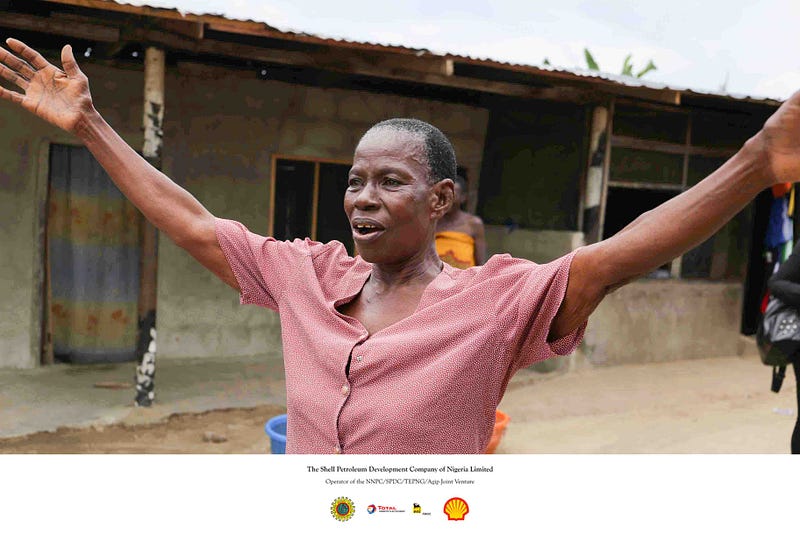
When we returned in September, 7 months later, we met a completely transformed Apple. When she sighted the team, her excitement was palpable. The 64-year-old grandmother danced and jumped like a twelve-year-old. What happened? She said, “As you all operated on my eye, I started seeing well. Then you did it again few days ago and I was able to see even better, now I can see you and everybody here very well. ‘Nua’ (Thank you) Shell. God bless you”.
This for me, is what Hope in Sight means.
Happy World Sight Day from all of us at Nigeria Health Watch and Shell Nigeria Vision First Team! What does #HopeInSight mean to you? Share with us in the comment section below, or on social media, @nighealthwatch on Twitter and @nigeriahealthwatch on Facebook and Instagram.
EpiAFRIC is a public health consultancy firm headquartered in Abuja that provides professional services including courses for health practitioners, research, evaluations, conferences, and health communications. EpiAFRIC also hosts the annual Health Meets Tech Hackathon.


